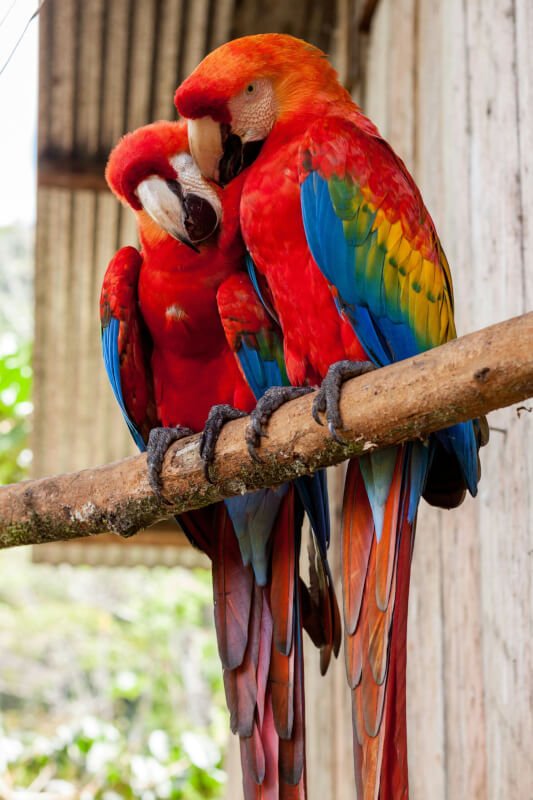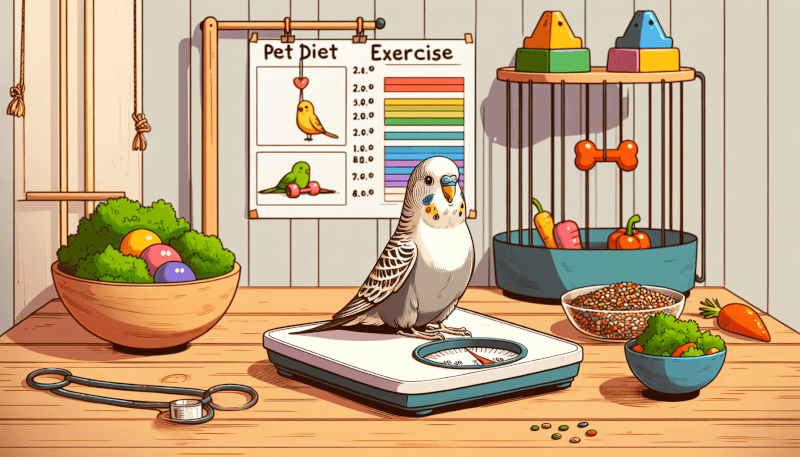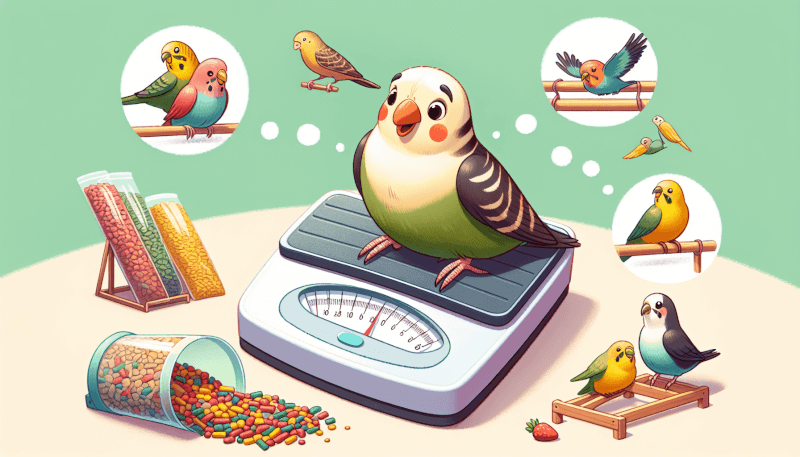Is your feathered friend starting to show signs of being a little overweight? Don’t worry, we’ve got you covered! In this article, we will share some valuable tips on how to manage your bird’s weight through diet and exercise. By making a few simple changes to their daily routine and implementing a nutritious diet plan, you can ensure that your bird stays fit, healthy, and at their optimal weight. So, let’s dive right in and discover how you can effectively keep your bird in the best shape possible!
Introduction
Understanding the Importance of Managing Your Bird’s Weight
As a responsible bird owner, it is crucial to understand the importance of managing your bird’s weight. Just as with humans, obesity can lead to a wide range of health problems in birds, including heart disease, liver issues, and joint problems. By maintaining a healthy weight for your feathered friend, you can significantly improve their overall well-being and lifespan.
The Potential Problems of Overweight Birds
Overweight birds can experience a variety of health issues that can impact their quality of life. Excess weight puts strain on their joints and can lead to arthritis and pain. It also increases the likelihood of heart and liver problems, making it harder for your bird to fly and causing general discomfort. Overweight birds may also struggle with regulating their body temperature, which can result in heat stress or respiratory issues. By proactively managing your bird’s weight, you can help prevent these potential problems and provide them with a happier, healthier life.
Dietary Tips
Choosing a High-Quality Bird Food
The foundation of a bird’s diet is the key to managing their weight effectively. It is essential to choose a high-quality bird food that meets their nutritional needs while maintaining a healthy weight. Look for options that are low in fat and sugar, with a balanced blend of grains, seeds, fruits, and vegetables. Avoid cheap, filler-filled bird foods that can contribute to weight gain.
Controlling Portion Sizes
Just like with humans, portion control plays a significant role in managing your bird’s weight. Be mindful of the recommended serving size for your bird’s particular species and adjust accordingly. Overfeeding can lead to weight gain, while underfeeding can result in malnutrition. It’s important to strike a balance and monitor your bird’s weight to determine the appropriate portion sizes for them.
Including Fresh Fruits and Vegetables
Fresh fruits and vegetables are an essential part of a healthy bird’s diet. They provide essential vitamins, minerals, and fiber while being low in calories. Incorporating a variety of colorful produce into your bird’s diet can help them maintain a healthy weight and improve their overall health. Just make sure to research which fruits and vegetables are safe for your specific bird species, as some can be toxic to them.
Avoiding High-Fat and Sugary Treats
Treats can be a fun way to bond with your bird, but it’s important to choose them wisely. Avoid giving your bird treats that are high in fat and sugar, as these can contribute to weight gain. Instead, opt for healthier alternatives such as small pieces of fresh fruit or vegetables as rewards. Moderation is key when it comes to treating your bird.
Monitoring Your Bird’s Food Intake
It’s crucial to monitor your bird’s food intake to ensure they are not overeating or undernourished. Keep track of the amount of food they consume daily and make adjustments as necessary. If your bird starts gaining weight, reduce their portion sizes slightly. Conversely, if they seem to be losing weight or lacking energy, increase their food intake. Regularly monitoring their food intake will help you maintain their ideal weight.

Exercise Recommendations
Encouraging Natural Flight
Encouraging natural flight is one of the best forms of exercise for your bird. If possible, create a safe and secure environment where your bird can spread their wings and fly freely. Keep doors and windows closed, ensure a bird-proof space, and supervise them during flight time. Allowing them to engage in natural flight helps strengthen their muscles, aids in weight management, and stimulates their physical and mental well-being.
Providing Bird-Safe Toys
Bird-safe toys are not only excellent for mental stimulation but also for physical exercise. Invest in a variety of toys that encourage your bird to move, such as ladders, swings, bells, and puzzle toys. These toys provide opportunities for climbing, swinging, and problem-solving, which can help burn calories and promote weight management. Rotate the toys regularly to keep your bird engaged and entertained.
Creating a Stimulating Environment
A stimulating environment is crucial for your bird’s overall well-being. Offer a variety of perches at different heights and textures, as these will encourage your bird to move and exercise. Create spaces for exploration and provide opportunities for your bird to interact with their surroundings. This can include placing toys, foraging opportunities, and hideouts throughout their living space. By keeping their environment dynamic and interesting, you can promote physical activity and prevent boredom-related weight gain.
Setting Up Agility Courses
Agility courses are a fantastic way to engage your bird in physical exercise while also challenging their cognitive abilities. Create an agility course using bird-safe materials such as wooden perches, tunnels, and hoops. Train your bird to navigate the course, rewarding them with treats or praise for their efforts. Agility courses not only provide physical exercise but also mental stimulation, reinforcing the bond between you and your bird.
Regular Out-of-Cage Time
Allowing your bird regular out-of-cage time is essential for their overall health and weight management. Provide a safe and supervised space where your bird can explore, exercise, and interact with you. During this time, engage in interactive play with your bird, such as fetch or teaching them tricks. Encouraging physical activity outside of the cage helps prevent weight gain, promotes muscle tone, and encourages mental enrichment.
Determining Your Bird’s Ideal Weight
Identifying the Breed and Species
The first step in determining your bird’s ideal weight is to identify their breed and species. Different bird species have varying ideal weight ranges, so it’s essential to know what is considered healthy for your specific bird. Research your bird’s breed or consult with an avian expert to gain a better understanding of what constitutes a healthy weight range for them.
Consulting an Avian Veterinarian
An avian veterinarian is a valuable resource when it comes to determining your bird’s ideal weight. They can examine your bird, take their measurements, and provide you with specific guidance tailored to your bird’s species and individual needs. Consultation with an avian veterinarian ensures you have accurate information and professional guidance in managing your bird’s weight effectively.
Using Body Condition Scoring Systems
Body condition scoring systems are a helpful tool in determining your bird’s ideal weight. These systems involve assessing your bird’s overall body condition based on factors such as muscle tone, fat deposits, and feather condition. Avian experts and veterinarians use these scoring systems to provide an objective evaluation of your bird’s body composition and weight. By using these systems, you can track your bird’s progress and make informed decisions about their diet and exercise routines.

Monitoring Weight and Progress
Choosing an Accurate Scale
To monitor your bird’s weight accurately, it’s important to invest in an accurate, avian-specific scale. Regular household scales may not provide precise measurements for your bird due to their small size. Look for a scale that can measure in grams or ounces and has a stable platform to ensure accurate readings. It’s best to weigh your bird at the same time each day for consistency.
Recording Regular Weigh-Ins
Recording regular weigh-ins is essential for tracking your bird’s progress and ensuring their weight management efforts are successful. Keep a record of their weight, date, and any relevant notes, such as changes in diet or exercise. Regular weighing allows you to identify any fluctuations or trends, and make necessary adjustments to their routines accordingly.
Establishing a Target Weight
With the guidance of an avian veterinarian, establish a target weight range for your bird. This target weight will act as a guide for your bird’s weight management journey. By having a clear goal, you can monitor their progress and make adjustments to their diet and exercise routines as needed. Keep in mind that every bird is unique, and their ideal weight may vary within the established range.
Tracking Changes Over Time
As you continue to manage your bird’s weight, track changes over time to assess their progress and adjust their routine accordingly. Regularly reassess your bird’s body condition using the body condition scoring system. Compare their current measurements to their initial weight, and note any trends or changes. This information will help you determine if further adjustments are needed to ensure your bird maintains a healthy weight.
Working with Avian Veterinarians
Seeking Professional Guidance
When it comes to managing your bird’s weight, seeking professional guidance from an avian veterinarian is crucial. They have the knowledge and expertise to provide individualized advice and support tailored to your bird’s specific needs. Avian veterinarians can help you develop a comprehensive diet and exercise plan that takes into account your bird’s breed, species, and current health condition.
Creating Individualized Diet and Exercise Plans
Avian veterinarians can work with you to create individualized diet and exercise plans that suit your bird’s unique needs. They will consider factors such as your bird’s nutritional requirements, target weight range, and any health concerns. By having a personalized plan, you can ensure that your bird’s weight management efforts are effective and safe.
Monitoring Overall Bird Health
Beyond weight management, avian veterinarians play a vital role in monitoring your bird’s overall health. Regular check-ups are essential for catching any weight-related or other health issues early on. Avian veterinarians can perform thorough examinations, conduct necessary bloodwork, and offer guidance on preventive care, promoting optimal health for your bird.
Seeking Medical Intervention, if necessary
In some cases, medical intervention may be necessary when managing your bird’s weight. If your bird is significantly overweight or has underlying health issues, avian veterinarians might recommend additional interventions, such as medication or specialized diets. It’s essential to follow your veterinarian’s advice closely and address any medical concerns promptly to ensure the best outcome for your bird.

Preventing Weight-Related Issues
Educating Yourself About Common Bird Health Issues
Educating yourself about common bird health issues is crucial in preventing weight-related problems. By understanding the potential health risks associated with obesity, you can take appropriate measures to prevent them. Stay informed about symptoms and early warning signs to ensure that you can address any concerns promptly.
Establishing a Routine Veterinary Check-Up
Regular veterinary check-ups are a cornerstone of preventive care for your bird. Schedule routine visits with an avian veterinarian to monitor your bird’s overall health and discuss any weight concerns. These check-ups provide an opportunity to discuss diet and exercise plans, address any behavioral issues, and seek guidance on maintaining your bird’s weight and well-being.
Promoting Mental Stimulation and Enrichment
Promoting mental stimulation and enrichment is a vital component of weight management for your bird. By providing a stimulating environment, offering new toys and activities, and engaging in interactive play, you can prevent boredom-related overeating and weight gain. Keep your bird’s mind engaged by introducing new challenges and providing opportunities for mental exercise alongside physical activity.
Preventing Boredom and Overeating
Boredom and overeating often go hand in hand for birds. Ensure that your bird has plenty of mental and physical stimulation throughout the day to prevent them from turning to food for entertainment. Rotate toys regularly, provide foraging opportunities, and engage with your bird in interactive play. By keeping them mentally stimulated, you can help prevent overeating and weight problems associated with boredom.
Recognizing Signs of Obesity
Checking for Difficulty Breathing
Difficulty breathing is one common sign of obesity in birds. When a bird is carrying excess weight, it can put pressure on their respiratory system, making it more difficult for them to breathe. If you notice your bird panting, wheezing, or gasping for breath, it’s essential to consult with an avian veterinarian to address any weight-related respiratory issues.
Assessing Reduced Activity Levels
Obesity can lead to a decrease in physical activity levels in birds. If you notice that your bird seems less active, reluctant to move, or spends prolonged periods perched without engaging in play or exploration, it may be a sign of weight gain. Regular exercise is crucial to keeping your bird healthy, and any decrease in activity should be investigated promptly.
Observing Changes in Feather Condition
Weight gain can also impact your bird’s feather condition. Excess weight can make it more challenging for birds to groom themselves effectively, leading to changes such as oily feathers, decreased feather quality, or even feather plucking. Regularly check your bird’s feathers for any signs of deterioration or abnormality and consult with an avian veterinarian if you have concerns.
Noting Changes in Appetite and Food Consumption
Monitoring your bird’s appetite and food consumption is essential in recognizing signs of obesity. If your bird is constantly seeking food, begging for treats, or becoming aggressive or possessive around food, it may indicate overeating and potential weight gain. Changes in your bird’s eating habits should be noted and discussed with an avian veterinarian to address any weight-related concerns.

Seeking Behavioral Advice
Understanding the Link Between Behavior and Weight
There is a strong link between behavior and weight in birds. Behavioral issues such as stress, anxiety, and overeating can contribute to weight gain. Understanding this connection is crucial in managing your bird’s weight effectively. By addressing any behavioral triggers, you can help your bird maintain a healthy weight and promote overall well-being.
Identifying Stressors and Behavioral Triggers
It’s essential to identify stressors and behavioral triggers that may contribute to weight gain in your bird. These triggers can include changes in their environment, lack of mental stimulation, or changes in their social dynamics. By pinpointing these triggers, you can take appropriate steps to address them and reduce their impact on your bird’s weight and behavior.
Addressing Anxiety and Overeating
Anxiety and overeating often go hand in hand. If your bird displays signs of anxiety, such as excessive vocalization, feather plucking, or self-destructive behaviors, it’s crucial to address these issues to prevent weight gain. Consult with an avian veterinarian or a qualified bird behaviorist to develop strategies to reduce anxiety and promote healthier coping mechanisms for your bird.
Conclusion
Taking responsibility for your bird’s health is an essential part of being a caring and informed bird owner. By managing your bird’s weight through a balanced approach of diet and exercise, you can ensure that they lead a happy and healthy life. Remember to consult with an avian veterinarian, create individualized plans, and monitor your bird’s progress regularly. With proper care and attention, you can help your feathered friend maintain an ideal weight, promoting their overall well-being and longevity.



